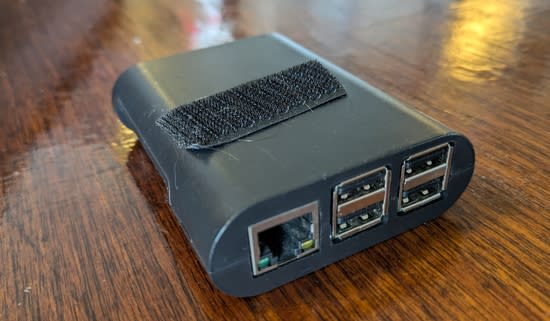When I initially switched the computer portion of my rhythm stage setup over to a Raspberry PI I went with a 32GB SD card because that's recommended. But I don't need very much space for what I'm doing and a bigger SD card makes copies slow: the cheap cards I've been using take me over an hour to write with my Mac's card reader.
I recently made some changes to my setup, removing support for bass whistle on the PI (now that I have an arduino-based version) and adding support for more foot-bass options. This normally means round of re-imaging all of my SD cards: I have a bunch of them because SD card corruption is probably the most common reason my system breaks [1], and it's easy to have extra cards. I'm pretty sick of 82-minute waits, however, so I decided to go down to four-GB SD cards.
I imaged a card with Raspberry
Pi OS Lite (64-bit), started setting it up, and immediately ran
out of space. Turns out apt-get update and apt-get
upgrade can use a lot of space. After apt-get
purge and apt-get clean, however, I had about
300MB to spare. It would probably be possible to get a lite
distribution to go a lot smaller than this, since the only actually
large thing I need is the sound font, fluid-soundfont-gm
at 145MB, but this seems to work fine.
Regardless, it works great, and I can now image a card in 15min:
$ time sudo dd if=~/Desktop/rpi-4gb.dmg of=/dev/disk4 7782400+0 records in 7782400+0 records out 3984588800 bytes transferred in 877.723067 secs (4539688 bytes/sec) real 14m41.556s user 0m3.299s sys 0m28.741s
[1] This used to happen a lot, but now mostly doesn't. The hardware
hasn't changed, so I think the reason it has stopped happening is that
my Raspberry PI is no longer responsible for the bass whistle. My
MIDI router doesn't write to the file system, and doesn't read beyond
initialization, while the bass whistle version used the file system to
persist settings across reboots.

Depending on your devops pipeline (that is, how often do you reimage with DD, as opposed to updating in place, and what changes you make AFTER imaging), you might consider a few timesaving options:
For multiple copies of a master, it's common to have a large/fast setup that you install, update, tune, and prepare on, then prepare the image for distribution. There are lots of options for that, the simplest is to clean and shrink the filesystem, and use that shrunken filesystem as the image to distribute.